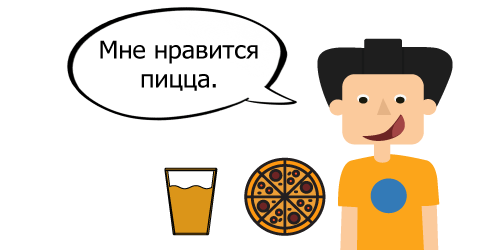
Russian course
Basic Russian for beginners
Lesson 7:
I like pizza
In this lesson you will learn:
- the conjugation of reflexive verbs
- the verb идти́ (to go)

Useful phrase in Russian
Listen and repeat the following sentence:
Мне нра́вится пи́цца
mnye nrá-vit-sya pí-tsa
I like pizza
The Russian cases: in lesson 9 you will learn more about "the cases in Russian". Now we just give you an example:
In English we do not say "I see he", but "I see him". Here we have modified "he", which transforms into "him". This modification is what we call "case" in Russian

Russian vocabulary
Read, listen and repeat the basic vocabulary of this lesson:
English
Russian
Pronunciation
To wash (something / someone)
Мыть
myt'
To wash oneself
Мы́ться
mýt'-sya
To dress (someone)
Одева́ть
a-dye-vát'
To dress oneself (get dressed)
Одева́ться
a-dye-vát'-sya
To like
Нра́виться
nrá-vit'-Sya
To go
Идти́
it-tí
Why
Почему́
pa-chye-mú
Because
Потому́ что
pa-ta-mú-shta
Maybe
Мо́жет быть
mó-zhet byt'
You are right (masc.) (informal)
Ты прав
ty praf
You are right (fem.) (informal)
Ты права́
ty pra-vá
You are right (formal)
Вы пра́вы
vy prá-vy

Dialogues in Russian
These dialogues will help you memorise this lesson's vocabulary:
Dialogue 1
English
Russian
Pronunciation
Good morning, Lena. What are you doing?
До́брое у́тро, Ле́на. Что ты де́лаешь?
dó-bra-ye ú-tra, lyé-na. shto ty dyé-La-yesh?
Hi Dima. Now I'm going to wash myself. And you?
Приве́т, Ди́ма. Сейча́с я иду́ мы́ться. А ты?
pri-vyét dí-ma. sej-chás ya i-dú mýt'-sya. a ty?
I'm going to wash the dishes, but I don't want to.
Я иду́ мыть посу́ду, но я не хочу́.
ya i-dú myt' pa-sú-du, no ya nye ha-chú.
Yesterday I also didn't want to wash the dishes, but I washed them, and you watched a movie.
Вчера́ я то́же не хоте́ла мыть посу́ду, но я мы́ла, а ты смотре́л фильм.
fchye-rá ya tó-zhe nye ha-tyé-La myt' pa-sú-du, no ya mý-la, a ty sma-tryéL film.
Yeah, Yeah, I know... you are right, as always.
Да, да, я зна́ю... ты права́, как всегда́.
da, da, ya zná-yu... ty pra-vá, kak fsyeg-dá
Dialogue 2
English
Russian
Pronunciation
Masha, you know what? I like how you dress. You are very fashionable.
Ма́ша, зна́ешь что? Мне нра́вится, как ты одева́ешься. Ты о́чень мо́дная.
má-sha, zná-yesh shto? mnye nrá-vit-sa, kak ty a-dye-vá-yesh-sya. Ty ó-chen' mód-na-ya.
Thanks, you also dress very well.
Спаси́бо, ты то́же одева́ешься о́чень хорошо́.
spa-sí-ba, ty tó-zhe a-dye-vá-yesh-sya ó-chyen' ha-ra-shó.
Thanks! My daughter also wants to dress well. Do you think I dress her fashionably?
Спаси́бо! Моя дочь то́же хо́чет одева́ться мо́дно. Как ты ду́маешь, я мо́дно её одева́ю?
spa-sí-ba! ma-ya doch tó-zhe hó-chet a-dye-vát-sa mód-na. kak ty dú-ma-yesh, ya mód-na ye-yó a-dye-vá-yu?
Of course, you dress (your) daughter very fashionably, too.
Коне́чно, ты одева́ешь дочь то́же о́чень мо́дно.
ka-nyésh-na, ty a-dye-vá-yesh doch tó-zhe ó-chyen' mód-na.
Dialogue 3
English
Russian
Pronunciation
Hello Tania, how are things?
Приве́т, Та́ня, как дела́?
pri-vyét, tá-nya, kak dye-Lá?
Not very (well), Mr Smith.
Не о́чень, ми́стер Смит.
nye ó-chyen', mís-ter smit.
Why?
Почему́?
pa-chye-mú?
Because I don't want to wash myself.
Потому́ что я не хочу́ мы́ться.
pa-ta-mú shta ya nye ha-chú mýt'-sya.
But you've washed yourself today, right?
Но ты мы́лась сего́дня, да?
no ty mý-las' sye-vód-nya, da?
No, I didn't. And you? Do you wash yourself? Did you wash yourself yesterday?
Нет, не мы́лась. А вы? Вы мо́етесь? Вы мы́лись вчера́?
nyet, nye mý-las. a vy? vy mó-ye-tes? vy mý-lis fchye-rá?
Of course I washed myself. I always wash myself. And you now go to wash yourself.
Коне́чно, я мы́лся. Я всегда́ мо́юсь. И ты сейча́с идёшь мы́ться.
ka-nyésh-na, ya mýl-sya. ya fsyeg-dá mó-yus. i ty syej-chás i-dyósh mýt'-sa.
You are right... I'm going now.
Вы пра́вы... сейча́с иду́.
vy prá-vy... syej-chás i-dú.
Do you want to learn Russian with the best courses and books?
We recommend our the best Russian course, with 150 videos and personal tutor.
If you love reading, have a look at these books with stories in easy Russian with audio.
If you want to practice your Russian, here you can find exercise books, with key and grammar tables.

Russian grammar
Read the following grammar explanations for this lesson:
Russian reflexive verbs
When we use a reflexive verb in a sentence, the subject and the object are the same. In English, we usually convey this idea adding"myself", "yourself", etc. (I wash myself, he speaks with himself,...).
In Russian we add one of these two particles: сь and ся.
- We use сь when the verb ends in a vowel.
- We use ся when the verb does not end in a vowel.
Now we will see an example in English and Russian with the same verbs: мыть (to wash) and мыться (to wash oneself):
Non reflexibe verb
To wash
I wash the dishes
You wash the dishes
He washes the dishes
We wash the dishes
You wash the dishes
They wash the dishes
past: washed
МЫТЬ
Я мо́ю посу́ду
Ты мо́ешь посу́ду
Он мо́ет посу́ду
Мы мо́ем посу́ду
Вы мо́ете посу́ду
Они́ мо́ют посу́ду
Он мыл посу́ду
Она́ мы́ла посу́ду
Мы мы́ли посу́ду
Reflexive verb
To wash oneself
I wash myself
You wash yourself
He washes himself
We wash ourselves
You wash yourselves
They wash themselves
Past: washed oneself
МЫ́ТЬСЯ
Я мо́юсь
Ты мо́ешься
Он мо́ется
Мы мо́емся
Вы мо́етесь
Они́ мо́ются
Он мылся
Она́ мы́лась
Мы мы́лись
The verb "to go": идти́
This is one of the few Russian verbs whose infinitive does not end with "ть".
In Russian there are many verbs to express movement, being идти the most important.
Present
Я иду́
Ты идёшь
Он / она́ / оно́ идёт
Мы идём
Вы идёте
Они́ идут
Past
Шёл
Шла
Шли

Test
Check how much you have learnt in this lesson:
This Russian course will always be free. Please share it.
When you share our website, you're helping us continue with our project: developing free Russian courses for everyone. Please, invest some seconds of your time in sharing us. Thank you.
|
Contact us Site map Terms of use Privacy policy Shop - Russian school Copyright © www.russianforfree.com All rights reserved. |


